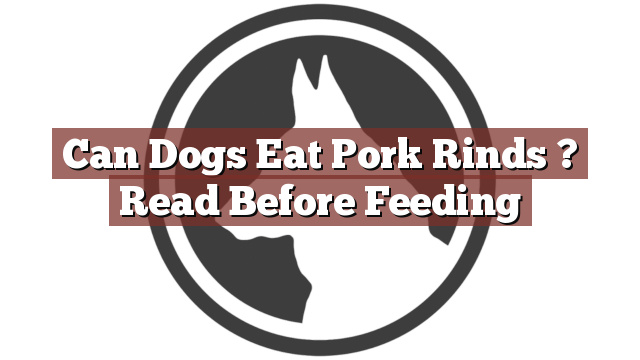Understanding Your Dog’s Dietary Needs
As a responsible dog owner, it is important to understand and meet your furry friend’s dietary needs. Dogs are omnivores, which means they can eat both meat and plant-based foods. However, their digestive system is not designed to process certain types of food that humans enjoy. It’s crucial to be aware of what is safe and healthy for your dog to consume.
Can Dogs Eat Pork Rinds? Read Before Feeding
Can dogs eat pork rinds? This is a question that often arises among pet owners. Pork rinds, also known as pork cracklings, are a popular snack made from fried or roasted pig skin. While it may be tempting to share your savory treat with your four-legged companion, it’s essential to consider the potential risks.
The answer is no. Dogs should not eat pork rinds. Although they may seem harmless, pork rinds can pose several dangers to your canine companion. Firstly, these snacks are usually high in fat and salt content. Consuming excessive amounts of fat and sodium can lead to digestive issues, including pancreatitis, obesity, and high blood pressure in dogs.
Moreover, pork rinds can be a choking hazard, especially for smaller dogs or those prone to gulping their food without chewing it thoroughly. The hard and brittle texture of pork rinds can easily get lodged in a dog’s throat, causing choking or even blockage in the digestive tract. Additionally, the seasoning or flavorings used in pork rinds, such as onion or garlic powder, can be toxic to dogs if consumed in large quantities.
Pros and Cons of Feeding Pork Rinds to Dogs
While it’s clear that feeding pork rinds to dogs is not recommended, it’s important to understand the potential pros and cons of this decision.
Pros:
There are no significant advantages to feeding pork rinds to dogs.
Cons:
-
High fat and sodium content: Pork rinds are typically high in unhealthy fats and sodium, which can lead to various health issues in dogs, including obesity, pancreatitis, and heart problems.
-
Choking hazard: The hard and brittle texture of pork rinds can be challenging to chew and swallow, posing a risk of choking or blockage in a dog’s digestive system.
-
Toxic seasoning and flavorings: Pork rinds often contain seasonings like onion or garlic powder, which can be harmful to dogs if ingested in large amounts.
Given these potential risks, it is best to avoid feeding pork rinds to your furry friend and opt for safer, dog-friendly treats instead.
Conclusion
In conclusion, it is important to prioritize your dog’s health and well-being when it comes to their diet. While dogs can eat a variety of foods, it’s crucial to be aware of what is safe and appropriate for them. Dogs should not eat pork rinds, as they are high in fat and sodium, pose a choking hazard, and may contain harmful flavorings. To ensure your dog’s nutritional needs are met, stick to a balanced diet of high-quality dog food and consult your veterinarian for advice on suitable treats. By making informed choices, you can keep your canine companion happy and healthy for years to come.
Thank you for taking the time to read through our exploration of [page_title]. As every dog lover knows, our furry friends have unique dietary needs and responses, often varying from one canine to another. This is why it's paramount to approach any changes in their diet with caution and knowledge.
Before introducing any new treats or making alterations to your dog's diet based on our insights, it's crucial to consult with a veterinarian about [page_title]. Their expertise ensures that the choices you make are well-suited to your particular pet's health and well-being.
Even seemingly harmless foods can sometimes lead to allergic reactions or digestive issues, which is why monitoring your dog after introducing any new food item is essential.
The content provided here on [page_title] is crafted with care, thorough research, and a genuine love for dogs. Nevertheless, it serves as a general guideline and should not be considered a substitute for professional veterinary advice.
Always prioritize the expert insights of your veterinarian, and remember that the health and happiness of your furry companion come first.
May your journey with your pet continue to be filled with joy, love, and safe culinary adventures. Happy reading, and even happier snacking for your canine friend!

